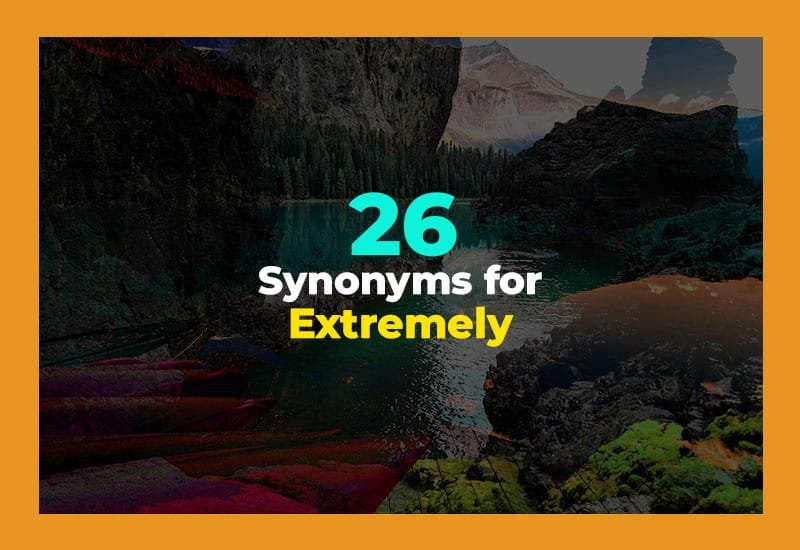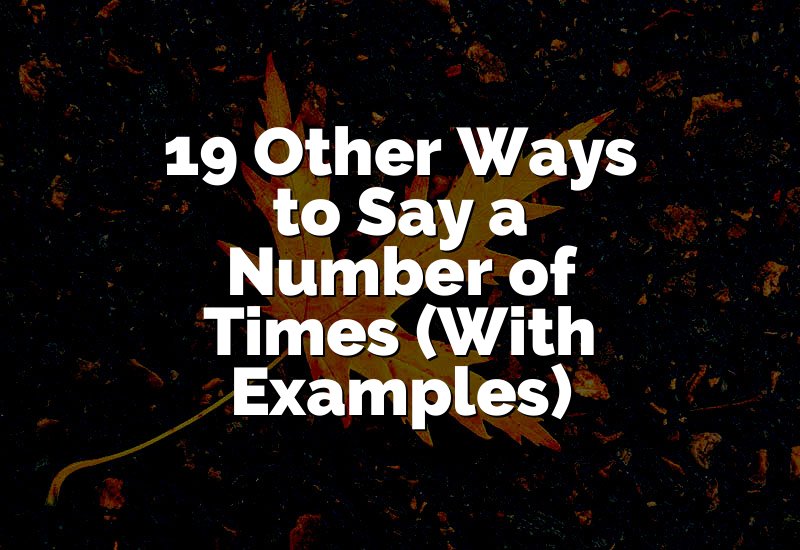When you want to describe something in a strong way, the word extremely is very useful. However, there are many other words that can make your writing more interesting. Words like very, highly, and tremendously can replace it easily. In this article, we will explore different ways to say extremely with examples.
| Synonym | Meaning | Example |
|---|---|---|
| Very | To a high degree | She was very happy with her new job. |
| Highly | At a great level | He is highly respected by his friends. |
| Tremendously | Very great or strong | The movie was tremendously exciting. |
| Immensely | Extremely large or great | She was immensely proud of her son. |
| Exceedingly | Beyond what is normal | The weather today is exceedingly hot. |
| Hugely | Very big or important | The project was hugely successful. |
| Exceptionally | Much better than usual | She is exceptionally talented in music. |
| Remarkably | Noticeably or unusually | He finished the race remarkably fast. |
| Enormously | Very big or strong | The house was enormously expensive. |
| Intensely | With extreme feeling | She stared at him intensely. |
| Extraordinarily | Very unusual or impressive | His performance was extraordinarily good. |
| Awfully | Very | The weather was awfully cold yesterday. |
| Super | Very good or impressive | The cake tastes super delicious. |
| Profoundly | Very deeply | She was profoundly moved by the speech. |
| Extremely | To a very high degree | He is extremely talented in drawing. |
| Massively | Very large or important | The stadium was massively crowded. |
| Overwhelmingly | Very strong or powerful | She felt overwhelmingly tired after work. |
| Seriously | Very much | He is seriously concerned about the issue. |
| Drastically | Very significant change | The prices dropped drastically last week. |
| Utterly | Completely or totally | The plan was utterly useless. |
| Deeply | Very strong feeling | He was deeply touched by the gesture. |
| Tremendously | Very much | She was tremendously excited for the trip. |
| Extremely | Very high degree | It was extremely difficult to decide. |
| Intensely | With a lot of energy or focus | He studied intensely for the exam. |
| Hugely | Very big or important | The festival was hugely popular. |
| Exceedingly | Beyond what is normal | The task was exceedingly challenging. |
26 Different Ways to Say EXTREMELY: Another Word for EXTREMELY
Very
The word very is one of the most common ways to describe something in a strong way. It makes your sentence clear and strong. You can use very to show high degree in any situation. This word can be added before adjectives or adverbs. For example, if someone is happy, you can say they are very happy. It is short but strong. People use it every day in talking and writing. It is easy to understand and easy to remember. Using very can make your ideas stronger.
- She was very excited about the gift.
- The water was very cold in the morning.
- He was very tired after the long journey.
Highly
The word highly shows a strong level or degree. It is often used to describe respect, opinion, or skill. For example, you can say someone is highly respected if many people admire them. This word makes your sentence more formal and strong. You can also use it to show intensity in work or ability. Using highly makes your statement more serious and important. It is a perfect word when you want to show a high standard or strong opinion.
- She is highly intelligent and quick.
- The book is highly recommended by teachers.
- He is highly skilled in cooking.
Tremendously
Tremendously is used to show very large or strong effects. It is stronger than very and gives a clear picture of size or impact. You can use it for emotions, results, or things that are very important. For example, a person can feel tremendously happy or a project can be tremendously successful. This word makes your sentence lively and powerful. People will easily understand the strength you want to show.
- The audience was tremendously impressed by the singer.
- She was tremendously happy with her results.
- The effort helped tremendously in completing the work.
Immensely
The word immensely shows something very large or great. You can use it to talk about feelings, size, or importance. For example, if someone feels immensely happy, they feel very happy. It is also useful to describe respect, love, or joy. Immensely makes your sentence sound strong and meaningful. It is a great word for both talking and writing when you want to emphasize something big or important.
- He is immensely proud of his team.
- The children were immensely excited about the trip.
- She was immensely grateful for the help.
Exceedingly
Exceedingly shows that something is beyond the normal level. It is very strong and serious. You can use it with positive or negative things. For example, you can say, “It is exceedingly difficult” to show it is very hard. This word is formal but very effective. It makes your statement more intense and clear. People will understand that the degree is much higher than usual.
- The mountain was exceedingly tall and steep.
- He was exceedingly careful with the documents.
- The weather was exceedingly hot during summer.
Hugely
Hugely shows something very big, important, or strong. You can use it for success, popularity, or size. It gives a clear sense of being very large. For example, if a project is hugely successful, it means it is very successful. This word can also show strong feelings or reactions. Using hugely makes your writing more exciting and strong.
- The movie was hugely popular among teenagers.
- She was hugely surprised by the news.
- The festival was hugely successful this year.
Exceptionally
Exceptionally shows that something is much better than normal. You can use it for talent, skill, or quality. It is a strong word to show something is very special. For example, “She is exceptionally good at singing” means her singing is much better than others. This word makes your statement powerful and clear. You can use it in writing or talking to show excellence or uniqueness.
- He is exceptionally talented in drawing.
- The food was exceptionally delicious.
- She handled the problem exceptionally well.
Remarkably
Remarkably shows something is unusual or worth noticing. You can use it to describe results, achievements, or qualities. For example, “He finished the work remarkably fast” means it was much faster than expected. This word makes your statement strong and interesting. It helps readers or listeners focus on the important or surprising part.
- The child spoke remarkably well for his age.
- The weather changed remarkably quickly.
- She performed remarkably in the competition.
Enormously
Enormously is used to show something very big or strong. It can be size, effect, or importance. You can say, “The house was enormously expensive” to show it is very costly. This word adds power to your sentence. It is strong and makes your writing or speaking more impressive. People will easily feel the large degree you mean.
- He was enormously happy with his results.
- The stadium was enormously crowded.
- She was enormously proud of her achievement.
Intensely
Intensely shows strong feeling or focus. You can use it to talk about emotions, actions, or experiences. For example, “She stared intensely” means she looked with a strong focus. This word is useful to show power in emotions or attention. It makes your sentence serious and interesting. You can also use it in many situations to show extreme degree.
- He studied intensely for the exam.
- She was intensely focused on the game.
- The sun shone intensely in the afternoon.
Extraordinarily
Extraordinarily shows something very unusual or impressive. It is stronger than normal words. For example, “His work was extraordinarily good” means it is much better than usual. This word makes your sentence strong and interesting. You can use it to describe talent, beauty, or results. It gives a sense of being very special or remarkable.
- She is extraordinarily skilled at painting.
- The performance was extraordinarily exciting.
- The view from the top was extraordinarily beautiful.
Awfully
Awfully shows a very high degree of something. You can use it with positive or negative things. For example, “The movie was awfully good” means very good, or “The weather was awfully cold” means very cold. This word is common and easy to use in daily life. It gives a clear idea of something strong or powerful.
- The cake was awfully sweet.
- She felt awfully tired after the trip.
- The room was awfully dark.
Super
Super is used to show very good or impressive things. You can use it in casual conversation. For example, “The food tastes super delicious” means it is very tasty. It is short and strong. People use it to show high degree in fun and positive situations.
- The party was super fun last night.
- He is super happy with his gift.
- The movie was super exciting to watch.
Profoundly
Profoundly shows something very deep or strong. It can be feeling, effect, or idea. For example, “She was profoundly moved” means she felt very strong emotions. This word makes your sentence serious and meaningful. You can use it in writing or speaking when showing strong importance or depth.
- He was profoundly touched by the speech.
- The book is profoundly interesting.
- She felt profoundly grateful.
Massively
Massively shows something very large or strong. You can use it for size, success, or impact. For example, “The stadium was massively full” means very crowded. This word gives a strong sense of size or power. It is easy to use and makes your sentence more exciting.
- The project was massively successful.
- The crowd was massively large at the concert.
- He improved massively in a short time.
Overwhelmingly
Overwhelmingly shows something very strong or powerful. It can be feeling, result, or effect. For example, “She felt overwhelmingly happy” means very strong happiness. This word gives a clear idea of a high degree. It makes your writing more expressive and strong.
- The team was overwhelmingly supportive.
- He felt overwhelmingly tired after work.
- The response was overwhelmingly positive.
Seriously
Seriously shows something is very much or important. You can use it to show concern or strong effect. For example, “He is seriously worried” means very worried. It is common in talking and writing. This word makes your statement strong and meaningful.
- She is seriously thinking about the future.
- He is seriously interested in learning music.
- The problem is seriously big and needs attention.
Drastically
Drastically shows a very strong change or effect. You can use it for actions, results, or decisions. For example, “The price dropped drastically” means it dropped a lot. This word shows intensity and importance. It is useful when talking about big differences or changes.
- The weather changed drastically in one day.
- He drastically improved his skills.
- The rules were changed drastically last month.
Utterly
Utterly shows complete or total degree. It is very strong. For example, “The plan was utterly useless” means it did not work at all. This word adds strong effect to your sentence. It is useful for talking about failure, surprise, or strong feelings.
- She was utterly shocked by the news.
- The house was utterly destroyed by the fire.
- He was utterly amazed at the performance.
Deeply
Deeply shows very strong feeling or intensity. You can use it for emotions, respect, or thoughts. For example, “He was deeply touched” means he felt very strong emotions. This word makes your writing or talking emotional and meaningful.
- She was deeply grateful for the help.
- He was deeply in love with her.
- They were deeply concerned about the situation.

Final Thoughts
Using different words instead of extremely makes your sentences more interesting and expressive. Words like tremendously, highly, and utterly help you show strong feelings or effects. Try these words to make your writing and talking more powerful and fun.









